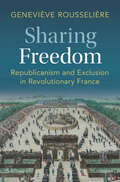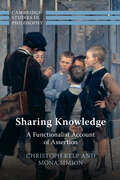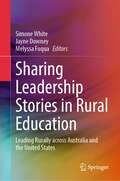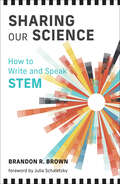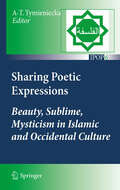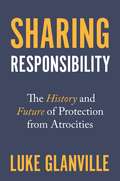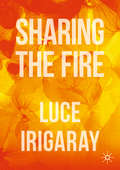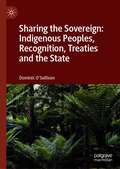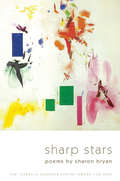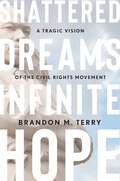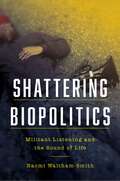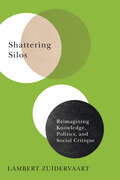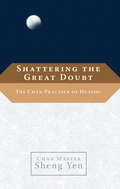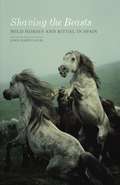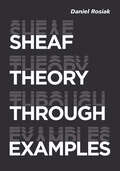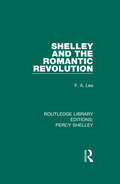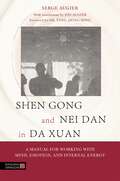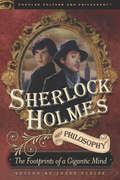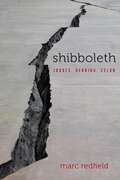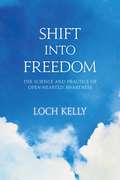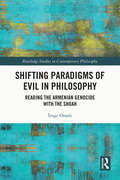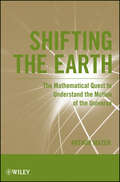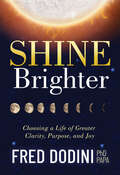- Table View
- List View
Sharing Freedom: Republicanism and Exclusion in Revolutionary France
by Geneviève RousselièreThe French have long self-identified as champions of universal emancipation, yet the republicanism they adopted has often been faulted for being exclusionary – of women, foreigners, and religious and ethnic minorities. Can republicanism be an attractive alternative to liberalism, communism, and communitarianism, or is it fundamentally flawed? Sharing Freedom traces the development of republicanism from an older elitist theory of freedom into an inclusive theory of emancipation during the French Revolution. It uncovers the theoretical innovations of Rousseau and of revolutionaries such as Sieyès, Robespierre, Condorcet, and Grouchy. We learn how they struggled to adapt republicanism to the new circumstances of a large and diverse France, full of poor and dependent individuals with little education or experience of freedom. Analysing the argumentative logic that led republicans to justify the exclusion of many, this book renews the republican tradition and connects it with the enduring issues of colonialism, immigration, slavery, poverty and gender.
Sharing Knowledge: A Functionalist Account of Assertion (Cambridge Studies in Philosophy)
by Christoph Kelp Mona SimionAssertion is the central vehicle for the sharing of knowledge. Whether knowledge is shared successfully often depends on the quality of assertions: good assertions lead to successful knowledge sharing, while bad ones don't. In Sharing Knowledge, Christoph Kelp and Mona Simion investigate the relation between knowledge sharing and assertion, and develop an account of what it is to assert well. More specifically, they argue that the function of assertion is to share knowledge with others. It is this function that supports a central norm of assertion according to which a good assertion is one that has the disposition to generate knowledge in others. The book uses this functionalist approach to motivate further norms of assertion on both the speaker and the hearer side and investigates ramifications of this view for other questions about assertion.
Sharing Leadership Stories in Rural Education: Leading Rurally across Australia and the United States
by Simone White Jayne Downey Melyssa FuquaThis book brings together the two fields of ‘educational leadership’ and ‘rurality’ and builds on the growing field of inquiry into the significance of ‘adding the rural’ to all aspects of education. It explores the vibrancy and variety of opportunities and challenges that are met by rural education leaders and researchers from two particular countries, Australia and the United States. It illuminates and explores the concept of rural leadership and take an educational stance, shedding light into what it means to lead rurally for educational policy, research, schools, communities and for the next generation of rural leaders themselves. It presents stories from the field with insights into capabilities, approaches, models and strategies for improving practice and outcomes. In addition to adding to the international bodies of knowledge, this volume contributes to advancements in educational leadership theories, as well as expands understanding of requisite knowledge and skills as informed by the distinct circumstances and affordances of rural contexts. This book also explores the construct of service, and explores ways in which it has been infused in various rural education leadership contexts.
Sharing Our Science: How to Write and Speak STEM
by Brandon R. BrownA personal, practical, and inspirational guide to written and oral STEM communications for scientists and technical professionals.In Sharing Our Science, scientist-turned-writing teacher Brandon Brown offers an eminently useful guidebook for STEM practitioners looking to communicate their technical work to either a technical or a broader audience. Professionals are increasingly required to communicate their work through blogs, podcasts, and newsletters and to submit to traditional media. After seeing his colleagues struggle to find a writing guide that tackled the unique challenges of writing and speaking about scientific topics, Brown set out to write the definitive handbook to assist STEM students, scientists, engineers, and tech workers alike.In this practical and relevant book, Brown uses his experience as a proven science communicator to cover three levels of writing: fundamental craft considerations, such as narrative tension, structure, sentences, and audience; unique scientific considerations, such as conveying numbers and utilizing metaphors; and finally, social considerations, such as public speaking and writing inside and outside of silos. In place of a reference manual, Brown&’s engaging narrative guide clarifies the fundamental principles that impact all scientific communication tasks, from white papers and slide decks to Zoom meetings and emails. Sharing Our Science represents the culmination of a lifetime of writing, research, and teaching that will enrich scientists&’ careers and illuminate the ways in which science is done and conveyed to the world.
Sharing Poetic Expressions
by Anna-Teresa TymienieckaA world ever more extensively interlinked is calling out for serving human interests broader and more compelling than those inspiring our technological welfare. The interface between cultures - at the moment especially between the Occident and Islam - presents challenges to mutual understandings and calls for restoring the resources of our human beings forgotten in the struggle of competition and rivalry at the vital spheres of existence. In the evolutionary progress of the living beings the strictly vital concerns, emotions, attributes become sublimed and elevated to the spiritual sphere at which human beings encounter each other and share. Studies presented here bring forth sublimity, generosity, forgiveness, beauty, and are exalting the quest after ciphers and symbols which lead to our sharing the common deepest stream of fraternal reality.
Sharing Responsibility: The History and Future of Protection from Atrocities (Human Rights and Crimes against Humanity #43)
by Luke GlanvilleA look at the duty of nations to protect human rights beyond borders, why it has failed in practice, and what can be done about itThe idea that states share a responsibility to shield people everywhere from atrocities is presently under threat. Despite some early twenty-first century successes, including the 2005 United Nations endorsement of the Responsibility to Protect, the project has been placed into jeopardy due to catastrophes in such places as Syria, Myanmar, and Yemen; resurgent nationalism; and growing global antagonism. In Sharing Responsibility, Luke Glanville seeks to diagnose the current crisis in international protection by exploring its long and troubled history. With attention to ethics, law, and politics, he measures what possibilities remain for protecting people wherever they reside from atrocities, despite formidable challenges in the international arena.With a focus on Western natural law and the European society of states, Glanville shows that the history of the shared responsibility to protect is marked by courageous efforts, as well as troubling ties to Western imperialism, evasion, and abuse. The project of safeguarding vulnerable populations can undoubtedly devolve into blame shifting and hypocrisy, but can also spark effective burden sharing among nations. Glanville considers how states should support this responsibility, whether it can be coherently codified in law, the extent to which states have embraced their responsibilities, and what might lead them to do so more reliably in the future.Sharing Responsibility wrestles with how countries should care for imperiled people and how the ideal of the responsibility to protect might inspire just behavior in an imperfect and troubled world.
Sharing the Fire: Outline of a Dialectics of Sensitivity
by Luce IrigarayWhilst he broaches the theme of the difference between the sexes, Hegel does not go deep enough into the question of their mutual desire as a crucial stage in our becoming truly human. He ignores the dialectical process regarding sensitivity and sensuousness. And yet this is needed to make spiritual the relation between two human subjectivities differently determined by nature and to ensure the connection between body and spirit, nature and culture, private life and public life. This leads Hegel to fragment human subjectivity into yearnings for art, religion and philosophy thereby losing the unity attained through the cultivation of a longing for the absolute born of a desire for one another as different.Furthermore, our epoch of history is different from the Hegelian one and demands that we consider additional aspects of human subjectivity. This is essential if we are to overcome the nihilism inherent in our traditional metaphysics without falling into a worse nihilism due to a lack of rigorous thinking common today.The increasing power of technique and technologies as well as the task of building a world culture are two other challenges we face. Our sexuate belonging provides us with a universal living determination of our subjectivity – now a dual subjectivity - and also with a natural energy potential which allows us to use technical resources without becoming dependent on them.
Sharing the Sovereign: Indigenous Peoples, Recognition, Treaties and the State
by Dominic O'SullivanThis book explains how recognition theory contributes to non-colonial and enduring political relationships between Indigenous nations and the state. It refers to Indigenous Australian arguments for a Voice to Parliament and treaties to show what recognition may mean for practical politics and policy-making. It considers critiques of recognition theory by Canadian First Nations’ scholars who make strong arguments for its assimilationist effect, but shows that ultimately, recognition is a theory and practice of transformative potential, requiring fundamentally different ways of thinking about citizenship and sovereignty. This book draws extensively on New Zealand’s Treaty of Waitangi and measures to support Maori political participation, to show what treaties and a Voice to Parliament could mean in practical terms. It responds to liberal democratic objections to show how institutionalised means of indigenous participation may, in fact, make democracy work better.
Sharp Stars
by Sharon BryanSharon Bryan's fourth poetry collection blends such disparate subjects as biology, astronomy, sports, philosophy, and music to probe humankind's desire for spiritual, even physical, transcendence. From Charles Mingus to Charles Barkley, from Buddy Holly to Bishop Berkeley, no reference is squandered in Bryan's prodigious imagination.Sharon Bryan's awards include the Academy of American Poets Prize, the Discovery Prize from The Nation, and two NEA fellowships. She has published three poetry collections and edited Planet on the Table: Poets on the Reading Life and Where We Stand: Women Poets on Literary Tradition. She is a visiting professor of poetry at the University of Connecticut at Storrs.
Sharp Stars (American Poets Continuum #119.00)
by Sharon BryanSharon Bryan’s fourth poetry collection blends such disparate subjects as biology, astronomy, sports, philosophy, and music to probe humankind’s desire for spiritual, even physical, transcendence. From Charles Mingus to Charles Barkley, from Buddy Holly to Bishop Berkeley, no reference is squandered in Bryan’s prodigious imagination.Sharon Bryan’s awards include the Academy of American Poets Prize, the Discovery Prize from The Nation, and two NEA fellowships. She has published three poetry collections and edited Planet on the Table: Poets on the Reading Life and Where We Stand: Women Poets on Literary Tradition. She is a visiting professor of poetry at the University of Connecticut at Storrs.
Shattered Dreams, Infinite Hope: A Tragic Vision of the Civil Rights Movement
by Brandon M. TerryA landmark reinterpretation of the civil rights movement that challenges reductive heroic narratives of the 1950s and 1960s and invigorates new debates and possibilities for the future of the struggle for liberation.We are all familiar with the romantic vision of the civil rights movement: a moment when heroic African Americans and their allies triumphed over racial oppression through courageous protest, forging a new consensus in American life and law. But what are the effects of this celebratory storytelling? What happens when a living revolt against injustice becomes an embalmed museum piece?In this innovative work, Brandon Terry develops a novel theory of interpretation to show how competing accounts of the civil rights movement circulate through politics and political philosophy. The dominant narrative is romantic. This “arc of justice” narrative is found in popular histories, the speeches of Barack Obama, and even the writings of the liberal philosopher John Rawls. Despite being public orthodoxy, these romantic visions are exhausted and unpersuasive on their own terms. The breakdown of the authority of this history of justice has created space for a rival ironic mode, embodied in the political ideas of Afropessimism. While offering a sympathetic critique, Terry ultimately finds Afropessimist thought self-undermining and unworkable.Instead, he argues, the civil rights movement is best understood in tragic terms. By challenging the attachment to triumphant pasts, Terry demonstrates that tragedy exemplifies what the civil rights movement has been and can still be. Provocative and original, Shattered Dreams, Infinite Hope offers an optimistic political vision without naïveté, to train our judgment and resilience in the face of reasonable despair.
Shattered: A Memoir
by Hanif KureishiFrom acclaimed author and playwright Hanif Kureishi comes an urgent and stunning memoir about rebuilding a new life in the wake of devastating physical loss.In late 2022, in Rome, Hanif Kureishi had a fall. When he came to, he realized he could no longer walk. He could do nothing without the help of others and required constant care in a hospital. So began a yearlong odyssey through the medical systems of Rome and Italy, with the hope of somehow being able to return home to his house in London.While confined to a series of hospital wards, he felt compelled to write, but being unable to type or hold a pen, he began to dictate to family members the words that formed in his head—thoughts on his medical condition, but also parenthood, immigration, sex, psychoanalysis, and, of course, writing. The result was an extraordinary series of dispatches from his hospital bed: a diary of a life in pieces, recorded with rare honesty, humor, and verve.Shattered takes these dispatches—edited, expanded, and meticulously interwoven with new writing—and charts both a shattering and a reassembling: a new life born of pain and loss but also animated by new feelings of gratitude, humility, and love.
Shattering Biopolitics: Militant Listening and the Sound of Life (Commonalities)
by Naomi Waltham-SmithA missed phone call. A misheard word. An indiscernible noise. All these can make the difference between life and death. Failures to listen are frequently at the root of the marginalization and exclusion of certain forms of life. Audibility decides livability. Shattering Biopolitics elaborates for the first time the intimate and complex relation between life and sound in recent European philosophy, as well as the political stakes of this entanglement.Nowhere is aurality more pivotal than in the dialogue between biopolitical theory and deconstruction about the power over and of life. Closer inspection of these debates reveals that the main points of contention coalesce around figures of sound and listening: inarticulate voices, meaningless sounds, resonant echoes, syncopated rhythms, animal cries, bells, and telephone rings.Shattering Biopolitics stages a series of “over-hearings” between Jacques Derrida and Giorgio Agamben who often mishear or completely miss hearing in trying to hear too much. Notions of power and life are further diffracted as Hélène Cixous, Catherine Malabou, and Jean-Luc Nancy join in this high-stakes game of telephone. This self-destructive character of aurality is akin to the chanciness and risk of death that makes life all the more alive for its incalculability.Punctuating the book are a series of excurses on sound-art projects that interrogate aurality’s subordination and resistance to biopower from racialized chokeholds and anti-migrant forensic voice analysis to politicized speech acts and activist practices of listening.Shattering Biopolitics advances the burgeoning field of sound studies with a new, theoretically sophisticated analysis of the political imbrications of its object of inquiry. Above all, it is sound’s capacity to shatter sovereignty, as if it were a glass made to vibrate at its natural frequency, that allows it to amplify and disseminate a power of life that refuses to be mastered.
Shattering Silos: Reimagining Knowledge, Politics, and Social Critique
by Lambert ZuidervaartQuestions first raised by Hannah Arendt in the 1960s take on new urgency in the post-truth era, as political leaders blithely reject facts in the public domain: Is truth politically impotent? Are politics inherently false? Is the search for truth still relevant?Shattering Silos, a companion volume to Religion, Truth, and Social Transformation and Art, Education, and Cultural Renewal, provides a path-breaking response. As in his two previous books, Lambert Zuidervaart challenges the boundaries philosophers set up between epistemology, ethics, and political philosophy. Knowledge, he argues, takes different forms in various social domains, and all are subject to political struggle. A critique of contemporary society must draw on many social domains of knowledge, including the arts and religion, and should recast politics as a striving for truth in the broadest sense. Proposing a new conception of truth – one that emphasizes the unity of knowledge and truth, as well as their diversity among different social domains – Zuidervaart asks what such holism and pluralism suggest about how we understand politics and society. This book proposes a new understanding of large-scale social change, challenging how most people think about knowledge and truth.Interweaving epistemology, social criticism, and political thought, Shattering Silos aims to help redirect an allegedly post-truth society.
Shattering the Great Doubt: The Chan Practice of Huatou
by Sheng YenHuatou is a skillful method for breaking through the prison of mental habits into the spacious mind of enlightenment. The huatou is a confounding question much like a Zen koan. Typical ones are "What is wu [nothingness]?" or "What was my original face before birth-and-death?" But a huatou is unlike a koan in that the aim is not to come up with an answer. The practice is simple: ask yourself your huatou relentlessly, in meditation as well as in every other activity. Don't give up on it; don't try to think your way to an answer. Resolve to live with the sensation of doubt that arises, and it will pervade your entire existence with a sense of profound wonder, ultimately leading to the shattering of the sense of an independent self. Master Sheng Yen brings the traditional practice to life in this practical guide based on talks he gave during a series of huatou retreats. He teaches the method in detail, giving advice for dealing with the typical pitfalls and problems that arise, and answering retreat participants' questions as they experience the practice themselves. He then offers commentary on four classic huatou texts, grounding his instructions in the teaching of the great Chan masters.
Shaving the Beasts: Wild Horses and Ritual in Spain
by John Hartigan Jr.A vivid first-person study of a notorious equine ritual—from the perspective of the wild horses who are its targets Wild horses still roam the mountains of Galicia, Spain. But each year, in a ritual dating to the 1500s called rapa das bestas, villagers herd these &“beasts&” together and shave their manes and tails. Shaving the Beasts is a firsthand account of how the horses experience this traumatic rite, producing a profound revelation about the durability of sociality in the face of violent domination. John Hartigan Jr. constructs an engrossing, day-by-day narrative chronicling the complex, nuanced social lives of wild horses and the impact of their traumatic ritual shearing every summer. His story generates intimate, individual portraits of these creatures while analyzing the social practices—like grazing and grooming—that are the building blocks of equine society. Shaving the Beasts culminates in a searing portrayal of the inspiring resilience these creatures display as they endure and recover from rapa das bestas. Turning away from &“thick&” description to &“thin,&” Hartigan moves toward a more observational form of study, focusing on behaviors over interpretations. This vivid approach provides new and important contributions to the study of animal behavior. Ultimately, he comes away with profound, penetrating insights into multispecies interactions and a strong alternative to humancentric ethnographic practices.
Sheaf Theory through Examples
by Daniel RosiakAn approachable introduction to elementary sheaf theory and its applications beyond pure math.Sheaves are mathematical constructions concerned with passages from local properties to global ones. They have played a fundamental role in the development of many areas of modern mathematics, yet the broad conceptual power of sheaf theory and its wide applicability to areas beyond pure math have only recently begun to be appreciated. Taking an applied category theory perspective, Sheaf Theory through Examples provides an approachable introduction to elementary sheaf theory and examines applications including n-colorings of graphs, satellite data, chess problems, Bayesian networks, self-similar groups, musical performance, complexes, and much more. With an emphasis on developing the theory via a wealth of well-motivated and vividly illustrated examples, Sheaf Theory through Examples supplements the formal development of concepts with philosophical reflections on topology, category theory, and sheaf theory, alongside a selection of advanced topics and examples that illustrate ideas like cellular sheaf cohomology, toposes, and geometric morphisms. Sheaf Theory through Examples seeks to bridge the powerful results of sheaf theory as used by mathematicians and real-world applications, while also supplementing the technical matters with a unique philosophical perspective attuned to the broader development of ideas.
Shelley and the Romantic Revolution (RLE: Percy Shelley #3)
by F.A. LeaFirst published in 1945. In this work the author seeks to correct the misinterpretation and incorrect labelling of Shelley’s thought. While not neglecting Shelley as a poet, this book focuses on his contributions made to the general movement of political and philosophical thought of his era and by so doing his relevance to contemporary issues. This title will be of interest to students of literature.
Shen Gong and Nei Dan in Da Xuan: A Manual for Working with Mind, Emotion, and Internal Energy
by Dr Jwing-Ming Yang Serge AugierThe teaching and practices of the ancient Daoist tradition of Da Xuan have been kept secret for generations. In this ground-breaking book, Serge Augier, the current inheritor of the Da Xuan system, presents this unique approach to Daoism and reveals the basic principles and theory behind the practice of Da Xuan. Weaving a masterful presentation of both astonishing depth and refreshing simplicity, Serge Augier covers the Daoist practices for developing mind, emotions and internal energy and provides specific exercises for cultivating and transforming the Jing (body energy), Qi (life force) and Shen (mind or spirit) on the path to enlightenment. He explains theory and practice in clear, easy-to-understand terms and explores the deeper reaches of Daoist internal alchemy in a way that gives access to practitioners of all levels to the necessary knowledge.
Sherlock Holmes and Philosophy
by Josef SteiffThis entertaining collection of essays shows that Sherlock Holmes sees things others don't. He sees the world in a different way, and by so doing, allows us to see that same world - and human behavior - in different ways as well. Oh, sure, there have been countless detectives who have followed in his footsteps and who seem to rival his abilities. Just turn on the TV or browse the local bookshop and you'll find idiosyncratic super sleuths using forensics and reasoning to solve a whole host of crimes and misdeeds. And yet no one rivals our dear, dear Holmes. Why does Sherlock reign, even more than a century later, as king? Can this mystery be solved? Unable to reach either Holmes or Watson (or Doyle for that matter, though we've tried every medium we can think of), we've been forced to gather our own team of investigators to practice their powers of observation and perception, to apply their own reasoning and methodologies to the task at hand. The results, I fear, have led us to a number of cases that must be solved first.Is Holmes simply eccentric or a sociopath? Is he human or something from the holodeck? Is he as dangerous on the page as he is in person? Wait - does he even exist? For that matter, do you? (I fear several investigators have been forced to take a much needed holiday after wrestling with that one.)What is the source of his faculty of observation and facility for deduction? Systematic training as Watson surmises? Genetic? Or is he just really lucky?And is this whole logic thing compatible with emotions? Are Holmes and Watson good friends or soul mates? Just what is the nature of friendship? Do they complete each other or just get on each other's nerves? And why all the secrecy? Disguises? Deceptions?The plot thickens. What is the essence of consciousness? Is the observable world subject to our intentions? Why does Holmes debunk mysticism when Doyle so readily embraces it? Why is Holmes our favorite drug user?Our notebooks are filled with clues and, dare I say, answers. Is there more than one way to define the concept, justice? Is hope necessary in the world? Is boredom? Play? Can any thing really be understood? Objectively?And just what is the last unresolved mystery involving Sherlock Holmes? The game that's afoot isn't just the thing being pursued but the fun to be had as well.
Shibboleth: Judges, Derrida, Celan (Lit Z)
by Marc RedfieldWorking from the Bible to contemporary art, Shibboleth surveys the linguistic performances behind the politics of border crossings and the policing of identities.In the Book of Judges, the Gileadites use the word shibboleth to target and kill members of a closely related tribe, the Ephraimites, who cannot pronounce the initial shin phoneme. In modern European languages, shibboleth has come to mean a hard-to-falsify sign that winnows identities and establishes and confirms borders. It has also acquired the ancillary meanings of slogan or cliché. The semantic field of shibboleth thus seems keyed to the waning of the logos in an era of technical reproducibility—to the proliferation of technologies and practices of encryption, decryption, exclusion and inclusion that saturate modern life. The various phenomena we sum up as neoliberalism and globalization are unimaginable in the absence of shibboleth-technologies.In the context of an unending refugee crisis and a general displacement, monitoring and quarantining of populations within a global regime of technics, Paul Celan’s subtle yet fierce reorientation of shibboleth merits scrupulous reading. This book interprets the episode in Judges together with Celan’s poems and Jacques Derrida’s reading of them, as well as passages from William Faulkner’s Absalom, Absalom! and Doris Salcedo’s 2007 installation Shibboleth at the Tate Modern. Redfield pursues the track of shibboleth: a word to which no language can properly lay claim—a word that is both less and more than a word, that signifies both the epitome and the ruin of border control technology, and that thus, despite its violent role in the Biblical story, offers a locus of poetico-political affirmation.
Shift into Freedom: The Science and Practice of Openhearted Awareness
by Loch KellyShift into Freedom presents innovative teacher Loch Kelly's training manual for actively participating in the evolution of your own consciousness. Synthesizing insights from neuroscience and psychology with wisdom from the world's contemplative traditions, Shift into Freedom offers an accessible and remarkably powerful series of meditations that lead us to a little-known natural capacity called "awake awareness. " Through an unfolding process of "small glimpses, many times," these exercises shift us from a thought-based knowing to an awareness-based way of operating in the world. With continued practice, we learn to "unhook" from our customary home in our ego-based identity--and then sustain an embodied presence and relatedness known as "open-hearted awareness. " Loch Kelly teaches that this is "the meeting place of awakening and growing up, where we have the capacity to handle a fully emotional, intimate life and act with authenticity and compassion. "
Shifting Paradigms of Evil in Philosophy: Reading the Armenian Genocide with the Shoah (Routledge Studies in Contemporary Philosophy)
by İmge OranlıThis book develops an interdisciplinary framework rooted in philosophy for addressing the political evils experienced around the world. Drawing on resources mainly from philosophy and historical studies, it argues for the relationality and continuity between political evils, using the Armenian Genocide and the Shoah as main examples.The book begins by unpacking a series of limiting assumptions that define the philosophical study of evil. These assumptions crystallize in the idea that evil is an inscrutable phenomenon, what the author calls the paradigm of evil’s inscrutability. Tracing this paradigm through the legacies of five key philosophers—Plato, Augustine, Kant, Arendt, and Levinas—the author shows that by the time we arrive at 20th century, the framing of political evils like the Shoah as inscrutable and exceptional is profoundly constraining; it erases Shaoh's continuity and connection with other atrocities, including the 1915 Armenian Genocide. The book next turns to practices and ideologies that connect the Armenian Genocide to the Shoah to propose an alternative paradigm for thinking about evil: a paradigm of the continuity of evils. Offering this paradigm to readers in philosophy and adjacent disciplines, the author explores the relationality between the Armenian Genocide and the Shoah, but also between Turkish genocide denialism and a contemporary case of racist evildoing against Armenians in Turkey, shifting the discussion of political evil in a direction that aims to turn overlooked evils around the world into objects of philosophical thinking.Shifting Paradigms of Evil in Philosophy will appeal to researchers and graduate students working in Continental philosophy, social and political philosophy, history of philosophy, ethics, political theory, genocide studies, and Holocaust studies.
Shifting the Earth
by Arthur MazerDiscover how mathematics and science have propelled history From Ancient Greece to the Enlightenment and then on to modern times, Shifting the Earth: The Mathematical Quest to Understand the Motion of the Universe takes readers on a journey motivated by the desire to understand the universe and the motion of the heavens. The author presents a thought-provoking depiction of the sociopolitical environment in which some of the most prominent scientists in history lived and then provides a mathematical account of their contributions. From Eudoxus to Einstein, this fascinating book describes how, beginning in ancient times, pioneers in the sciences and mathematics have dramatically changed our vision of who we are as well as our place in the universe. Readers will discover how Ptolemy's geocentric model evolved into Kepler's heliocentric model, with Copernicus as the critical intermediary. The author explains how one scientific breakthrough set the stage for the next one, and he also places the scientists and their discoveries within the context of history, including: Archimedes, Apollonius, and the Punic Wars Ptolemy and the rise of Christianity Copernicus and the Renaissance Kepler and the Counter-Reformation Newton and the Enlightenment Einstein and the detonation of the atom bomb Each chapter presents the work of a single scientist or mathematician, building on the previous chapters to demonstrate the evolutionary process of discovery. Chapters begin with a narrative section and conclude with a mathematical presentation of one of the scientist's original works. Most of these mathematical presentations, including the section on Einstein's special relativity, are accessible using only basic mathematics; however, readers can skip the mathematical sections and still follow the evolution of science and mathematics. Shifting the Earth is an excellent book for anyone interested in the history of mathematics and how the quest to understand the motion of the heavens has influenced the broader history of humankind.
Shine Brighter: Choosing a Life of Greater Clarity, Purpose, and Joy
by Fred DodiniFind direction in your life with this clear pathway to help committed people achieve their highest and brightest potential.In an increasingly lonely, chaotic, and darkening world, more people are struggling to find direction in their lives and to achieve greater connection and cohesion in their relationships. As many people see the social and political connections between people deteriorate, they are also discovering that the bonds that hold marriages and families together are weakening too. In the face of these mounting challenges, good people everywhere need an axiom that unites them and a plan of action for achieving the best outcomes for themselves, their families, and their communities. Shine Brighter shares a simple yet essential truth about human beings’ purpose and destiny. Throughout these pages, Fred Dodini explains how the sun, the moon, and the stars provide models to assist individuals in making the most important decision of their lives.
